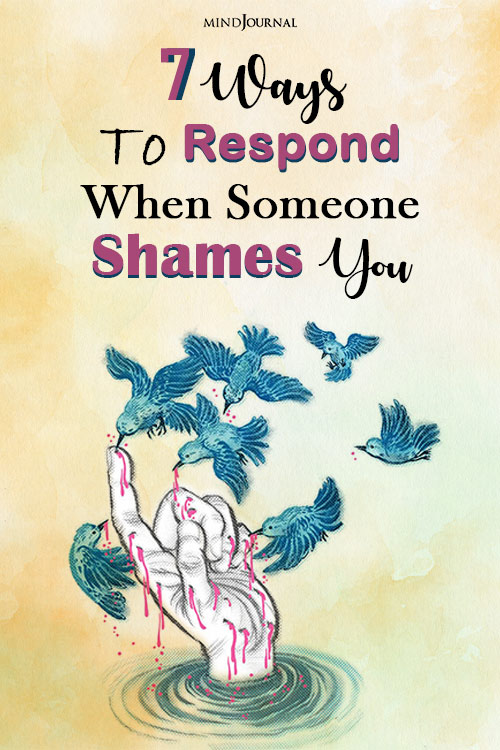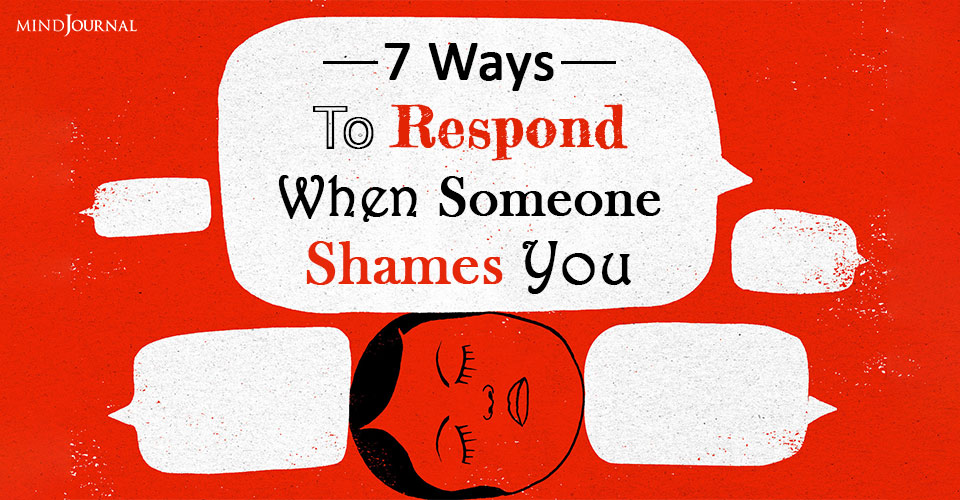Research says that shaming is a power play.
How can you find your own power? How to respond when someone shames says you?
Arthur* is a smart, thoughtful, and generally well-liked graduate student, so he was stunned when one of his professors responded to a question he asked in a seminar by telling him he was a complete idiot.
“I turned bright red,” he said. “And for what was maybe the first time in my life, I couldn’t say a word or even think a coherent thought. It was like my brain completely shut down.”
Theresa*, a nurse, had a similar reaction when the head nurse at her agency yelled at her for a minor mistake on her timesheet. “I wasn’t denying that I was at fault,” Theresa said, “but it was about my time, not about a patient.
I hadn’t hurt anyone but myself, but the way she acted, it was like I was the most horrible, stupid, idiotic person, alive. And I couldn’t respond. All I could do was stand there. I kept telling myself I wasn’t going to cry. That was all I could think about. But of course, I did cry, and then I was furious with myself.”
Research shows that shame and guilt, while sometimes connected, are very different emotions. In the best of circumstances, guilt, or an acknowledgment of wrongdoing, can lead to positive change in a person’s behavior. Shame is a way of closing a person down; research shows that shame, humiliation, and emotional and physical abuse are often closely connected.
Also read 5 Types Of Conversations That Can Kill A Relationship
One researcher says that people who described feeling humiliated said that they felt “wiped out, helpless, confused, sick in the gut, paralyzed, or filled with rage. It was as if they were made small, stabbed in the heart, or hit in the solar plexus. Usually, they felt themselves flushing and wished they could disappear. No matter how many years have passed, the experience remains vivid and fresh in their minds” (Klein, 1991).
Humiliated patients in a study of doctor-patient relationships felt exposed or stigmatized, diminished, deficient, and degraded. A common response to being humiliated is to want to hide, to sink into the ground, or to disappear. And often, when we’re humiliated, we lose all ability to take action.
If this has ever happened to you, you know about these feelings. And you might even still sometimes think about what you could have done at the time, or after, to protect yourself.
It’s hard to go back to an old injury and make it right, but sometimes it does happen. But it’s not a bad idea to think about what you might do to protect yourself if it ever happens again, since, in the moment that you are being humiliated, you probably aren’t able to think about much except how to get away.
Here are seven ways to respond when someone shames you
These suggestions are based on my work as a therapist and current research on the topic.
1. Take your time to respond.
This isn’t so easy when your brain is frozen in horror and you just want to disappear. But if you can get your brain to start working again, you can often discover a way to respond.
You don’t have to apologize, take the blame, or counterattack, all of which can backfire at the moment.

Bella DePaulo has written a terrific post about this issue in which she describes the dangers of standing up to someone who humiliates you: she says, “Victims can easily become re-victimized in the nastiest ways—even when they are totally right about their complaints.”
2. Don’t take it personally.
First, take your mind off of yourself and try to silently understand what caused this other person to say this humiliating thing to you. Take as long as you need. Stare at the person with your mouth hanging open if you need to. They may try to humiliate you further, but that reaction, more than any words you can possibly come up with, shows how stunned you are that he or she could behave this way.
Sometimes the person who is humiliating you is not doing it on purpose, and when they see your reaction, they will be horrified and apologetic, although they may not always be able to let you know (because maybe now they’re ashamed).

When you think it’s possible that your boss didn’t mean to embarrass you in front of your team, for instance, a simple, direct response, in private, might be best. You could say, “Can I get on your calendar for five minutes today?” and then, when you meet, say something like “I know you didn’t mean to do it, but when you criticized me in front of the team, I was really distressed. I want to hear your critiques. You always have a really good perspective on things. But I’d really appreciate it if you could give me your criticism in private.”
You might get a genuine apology but remember: No one likes to be told they’ve done something wrong, so you might just get a grunt or even another criticism. Don’t take it to heart. If your boss genuinely didn’t mean to shame you, your point will have been made.
Even if someone wants you to be embarrassed or ashamed, be clear: No matter what you’ve done wrong, you don’t deserve to be humiliated. Certainly, take responsibility for any mistakes you made, but don’t accept that making a mistake means that you’re an unworthy person who should be denigrated by someone else.
Researchers tell us that it is important to recognize that when someone is trying to make you feel bad about yourself, it is generally because they have a problem, not because you’ve done something so terrible.
Also, read The Toxicity of Gossip: Why It Hurts Us More Than Anyone Else
3. Get out of the situation.
Neuroscientists tell us that you only have about 20 minutes to make an emotional conversation change directions; after that, you and the other person will be locked into a neurologically based pattern that only has the possibility of shifting after a period of separation.
So don’t hang around trying to make things better. Get some distance, and then, if you’re so inclined, revisit it with the other person. You can say something like, “I’m really not ready to discuss this with you right now,” or “I’m sorry you feel that way,” or nothing at all. Just leave as quickly as you can.

4. Understand the other person’s motivation.
Once you’re out of harm’s way, you can think about what might be going on. Understanding does not mean forgiving or feeling sorry for the other person. It’s simply a tool for helping you move out of the shadow of their behavior. It is also a way of helping you not to take their actions personally, and of seeing more clearly that it’s about them, not you.
One possibility is that they’re angry; perhaps because you shamed them in some way? It may not be something you’re even aware of, but if you search your mind, you may figure out that you did something recently that seemed insignificant to you, but that somehow embarrassed or shamed them. So now they’re getting you back, even if you didn’t do it on purpose and didn’t do anything even slightly matching what they’ve done to you.
Also, read The Subtle Art Of Taming Your Mindset
Another possibility is that someone has threatened their sense of their own power, and showing that they can hurt someone else is a way of asserting their strength. Sometimes this power play has a direct connection to the person being hurt, but sometimes it has more to do with a general feeling of powerlessness or impotence.
Research has shown that sexual abusers and harassers, for instance, often feel unattractive and/or powerless, though not necessarily consciously, so they “prove” their power over vulnerable others by harassing and abusing them.
And then?
5. Know that you are not alone.
DePaulo writes, “I doubt that anyone gets through life without ever feeling utterly humiliated.” She encourages readers to find and talk to others who have experienced the same thing, and to use their support network to get over the feelings. Further, as we are seeing with the Harvey Weinstein situation and other highly visible cases of sexual abuse, if a person does something to you, he or she has very likely done it to others as well.
Yet in far too many less-prominent cases it is hard to find out that others are or have been in the same situation. But part of not taking it personally is knowing that you are the victim, not the cause of the problem.
6. Be careful about retaliating.
Humiliation, according to research, is a mixture of anger and shame, so retaliation or revenge can feel like a good way to get your self-esteem back. But again, the danger is that someone who humiliates others in order to make themselves feel powerful is very likely to turn even nastier and strike back. Not retaliating, however, does not have to mean that you are being weak.
Strength can sometimes come from standing up for others in a similar situation when it’s possible, but it’s important not to criticize yourself if you are not ready to take that kind of open stand against something that has hurt or damaged you.
Also read When You Wonder If People Don’t Like You: 3 Things To Consider
7. Find a way to move forward.
You might not strike back directly, but you might find that not letting the person have a continued effect on you is its own form of revenge. You are not who they want you to be, or who they see you as. You have strengths and the capacity to live a full life without them, whether that means leaving a relationship or a job, changing supervisors, or simply not having anything to do with the person anymore.
Arthur was lucky. The professor who humiliated him was a good guy who, when he saw Arthur’s reaction, immediately apologized in front of the class. But that’s not what always happens. Because the person who did the humiliating often has power over the person they humiliate, you might not be able to get any real sense of closure with that person.

Theresa’s head nurse was known for taking out her anger on everyone who worked for her. Theresa had to get her closure through the support of colleagues. “Everybody knows there’s no standing up to her. You take her nastiness and you put your head down and keep going,” Theresa said. “It’s a really good job, so we just put up with her. And we support each other and give each other lots of positive feedback. It’s the best we can do.”
The real work in such a case is to not allow the person to damage your self-esteem. Support from others, like colleagues, friends, teachers, and mentors, is crucial. It also doesn’t hurt to keep a log of what has happened. Don’t do it if it makes you feel worse to revisit the experience, of course; but sometimes writing down what happened can help to get it out of your head. And as we’re seeing with the Weinstein case, one day your notes could be helpful; you might yet get a chance to be heard.
Also read How to Network Like a Pro: Even If You’re Shy, Introverted, or Just Hate Doing It
*Names and identifying info changed to protect privacy
copyright@fdbarth@2017
I love to know what you think about what I’ve written, so please leave your comments below, and if you have questions about the content or the ideas in this or any other post, put them in your comments!
References Klein, D. (1991). The humiliation dynamic: An overview. Journal of Primary Prevention, 12, 93–121. http://dx.doi.org/10.1007/BF02015214
Written by: F. Diane Barth, L.C.S.W
Originally appeared on: Psychology Today
Republished with permission











Leave a Reply